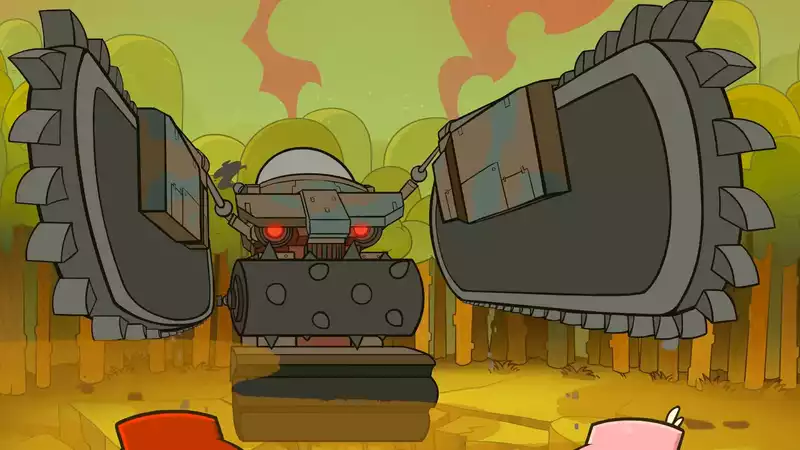The audacity of Team Meat is commendable; the formula for a Super Meat Boy sequel has been on the table for a decade since the original game's release. We fell in love with its ultra-precise jumps, blood splatters, and grotesque aesthetic of Garbage Pail Kids. The studio could have easily made no major changes to the core obstacle dodging, or to the plethora of new levels that would have earned a rousing ovation from Meat Boy's rabid fans and the speedrunner community. Instead, Team Meat took the exact opposite path: Super Meat Boy Forever is reminiscent of Super Mario Bros. 2. The characters are certainly familiar, but the design is a major departure from what made its predecessor a classic. For better or worse.
Dr Fetus reappears, once again disrupting the amicable civilian union of Meat Boy and Bandage Girl. He has kidnapped their adorably obnoxious child named Nugget and must negotiate the infernal ordeal of steel buzz saws, rusty syringes, and radiating laser beams to get him back. The only difference is that "Super Meat Boy" is now an auto-runner. From the moment the game is launched, the protagonist continues to sprint dead toward the right side of the screen. All of the genre's traditional hairline twists, such as pulling up the joystick at the right moment to avoid certain death or switching directions in mid-air, have been banished. Instead, "Forever" is primarily a game of timing. The meatboy's authority over his moves is limited, and the only way to keep the cute blob alive while cutting through the Rube Goldberg-like death traps in front of him is to jump and dodge with precision, like a parent doting on a precocious, elastic toddler.
This was a tough sell at first, and one of the reasons Super Meat Boy is so popular is its flawless controls. To enhance its features and reduce its accuracy seemed an odd choice at best, and a disastrous one at worst. Fortunately, Forever is far from a disaster. The heated chaos seen in the original version, with platformers moving so fast that they are forced to rely on primitive intuition rather than reasoning skills, is replicated in the sequel. The moment when everything clicks and you can finally go through the hectic ordeal unscathed still retains a deep sublimity. Team Meat also does just enough to keep the autorunning blueprint from becoming too clichéd. In one world, a belligerent purple ray appears, which, when defeated, temporarily grants Meat Boy the ability to break through certain barriers. In another, he found a tile that hardened as he passed through, giving him the chance to bounce backwards on it while searching for higher ground.
But too often while playing Forever, I longed for the rulebook of Super Meat Boy's ancestor. I was sitting on a perilous precipice, gazing at the cartoonish blades and grinders spread out before me, wondering how in the world I was going to make it through this anarchy in one piece. Suddenly, the way forward was illuminated: "Oh, I have to jump onto that platform to avoid the chainsaw. I understood. And we were off to the races.
Forever precludes any contemplation. The more you wear out your senses, full throttle, no brakes. On some level, I have come to demand a shred of autonomy - please, let me at least change the direction in which the meatboy runs - but the principles of Forever are unwavering. I want to go the other way. The best way to do that is to hit the wall at the back of the screen.
If the controls were still good, this frustration might be alleviated, but I encountered a number of strange and slippery malfunctions throughout "Forever." Meatboy is equipped with a forward thrust, which he uses to take down enemies and cross distances, but this weapon is relentless and inconsistent. And what I learned is that there is nothing more frustrating than slipping through giant hitboxes over and over again. On top of that, "Forever" is procedurally generated, connecting obstacles with random seeds. This worked more often than not, but there were certainly times when I had no idea where to go or what to do. The first game was challenging, but with a little observation was never obscure. I wanted more of the author's touch.
Much of Team Meat's indelible charm still exists. Meat Boy's worldview is at its best when it offers a devilish homage to the hellish 8-bit platformers of yesteryear. (I confronted Dr. Fetus on a conveyor belt rolling toward certain death. He threw ridiculously fast bullets at me, reminding me of the most harrowing levels of Mario Maker. It was supremely, absurdly difficult). Super Meat Boy Forever is as lively and rebellious as it recalls the original, but its platform design falls short of its established pedigree. The studio deserves credit for trying something different. I hope the simple fun of "Meat Boy" has not been compromised by the transition. .......
.

Comments